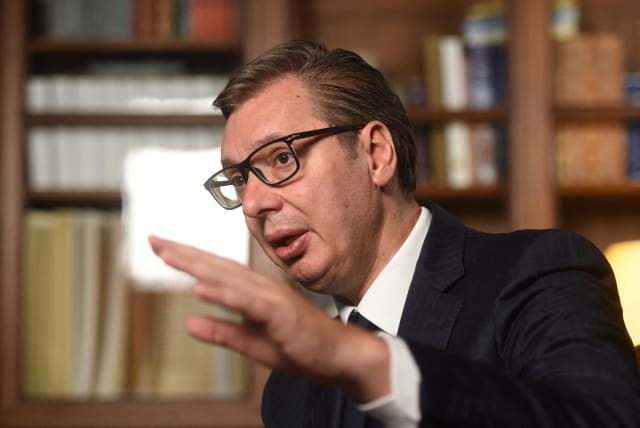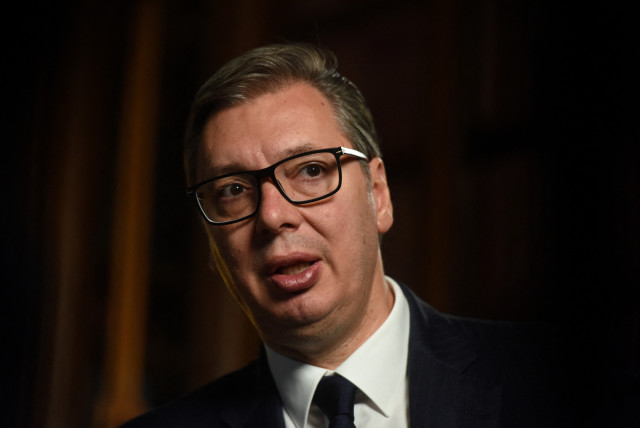Serbia shines through its president - opinion

Serbia is not interested in perpetuating conflicts. Instead, it focuses on international alliances and the prosperity of its own people.
It's easy for many to forget, but in the 90s, Europe was marred by a dreadful conflict — the war in the Balkans. This beautiful land, once torn apart by an ugly and repulsive ethnic war, has undergone a remarkable transformation. What was once a focus of instability has now become a beacon of stability. Achieving stability in the Balkans wasn't easy; it required leadership and courage.
Serbian President Aleksandar Vučić, who transitioned from serving in the Milosevic war government to becoming a man of peace, played a pivotal role. He recognized that Serbia's prosperity lies in peace and international alliances.
Serbia, having suffered through years of war, is not interested in perpetuating conflicts. Instead, its focus lies on international alliances and the prosperity of its own people. Criticisms suggesting otherwise often stem from a misunderstanding of modern small-country international diplomacy. The president of Serbia must maintain alliances with neighboring countries for the benefit of its citizens — a task far more challenging than writing articles. He is a leader of a country, not a TV commentator.
Vučić, often accused of being exclusively aligned with Putin, collaborates with a broad spectrum of nations, including Israel, the United States, the West, the East, China, and Russia. Serbia has worked with the US administration for years to bring peace to Kosovo, showcasing an independent foreign policy.
Serbia conducts an independent foreign policy, a central part of which is alliances with world powers. The critical articles present Serbia as a puppet of Moscow. It's a baseless accusation. There are many differences between the countries in foreign policy. For example, about the Israeli-Palestinian conflict: while Russia hosts the leaders of Hamas for meetings, in Serbia, there is a strong policy against extreme Islamic organizations.
Serbia does not support Russia's war in Ukraine but works to ease tensions and bring peace. Serbia's principled position, as someone under sanctions in the past, is against sanctions. In the state's view, the sanctions do not lead to a solution but to a hardening of positions. This is true for sanctions on Russia and any other country.
What does this have to do with presenting Serbia as a Russian branch?
Over the years, Serbia has played a significant role in preventing illegal immigration from Eastern Europe to the West and has been a key player in the war against the expansion of illicit goods and weapons. The country is strengthening its governance and the rule of law, contributing to the benefit of Europe's safety and security.
Vučić didn’t launch the relationship between Russia and Serbia. The cultural ties between the Russian and Serbian people run deep, and they are unlikely to be severed, regardless of the leadership in either country. They started before Putin and will last after him. What matters most is what the president of Serbia does for the benefit of its citizens. Alexander Vučić is committed to democracy, transparency, the rule of law, and stability.
Anyone who hears the critics of Vučić from the opposition might think that there are huge prison camps in Serbia for regime opponents, that it is impossible to say a word against the government, and there are no elections. The truth is completely the opposite. Serbia has a vocal opposition and a critical media.
The president encourages and is happy about the lively political debate in the country and respects his opponents. No fear or problem is expressing any opposition to the government. The elections are held under international supervision. If the day comes when the president loses an election, he will vacate his seat. Serbia is a stable and good democracy, which is respectable, although the opposition has no limits to trashing the country.
Only this week, Thousands of people supporting the opposition went out to demonstrate against the election results in Belgrade. The demonstrations are free, without any problem, as in any democratic country. Do you know dictatorships where they protest freely and peacefully against the election results?
Since Vučić assumed office as Prime Minister and President, Serbia has experienced economic prosperity. It has become a hub for knowledge-intensive industries and infrastructure projects connecting East and West. Once scarred by conflict, Belgrade is now considered one of the coolest cities in Europe. Serbs, proud of their country's progress, continue to vote for their president, recognizing the value of a strong nation, a robust economy, and positive relations with leaders across the region. Vučić's presidency is a testament to Serbia's journey from chaos to stability. One day, the world will also acknowledge this transformation.
Srulik Einhorn is the founder of www.perception.media, an election adviser to President Vučić, a strategic adviser, and a creative director to world leaders.
Jerusalem Post Store
`; document.getElementById("linkPremium").innerHTML = cont; var divWithLink = document.getElementById("premium-link"); if (divWithLink !== null && divWithLink !== 'undefined') { divWithLink.style.border = "solid 1px #cb0f3e"; divWithLink.style.textAlign = "center"; divWithLink.style.marginBottom = "15px"; divWithLink.style.marginTop = "15px"; divWithLink.style.width = "100%"; divWithLink.style.backgroundColor = "#122952"; divWithLink.style.color = "#ffffff"; divWithLink.style.lineHeight = "1.5"; } } (function (v, i) { });

